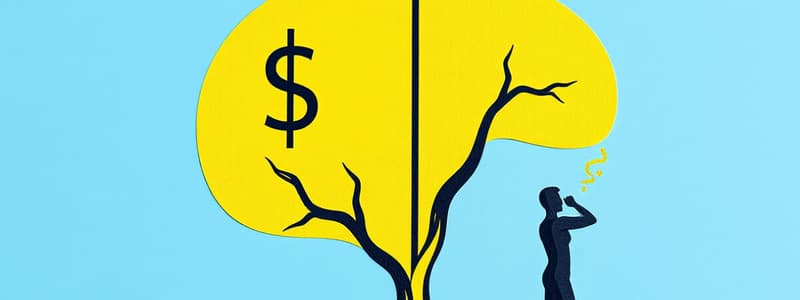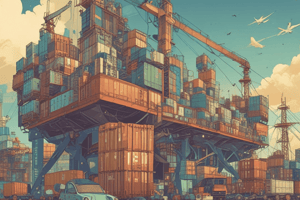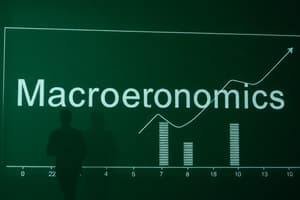Podcast
Questions and Answers
What are the 10 Principles of Economics? (Select all that apply)
What are the 10 Principles of Economics? (Select all that apply)
- Trade can make everyone worse off
- Prices rise when the government prints too much money (correct)
- People face trade-offs (correct)
- Markets are rarely a good way to organize economic activity
What is the goal of Macroeconomics?
What is the goal of Macroeconomics?
Managing the economy - jobs and low prices
What does the Phillips Curve claim?
What does the Phillips Curve claim?
There is a relationship between the unemployment rate and the inflation rate.
What is Fiscal Policy?
What is Fiscal Policy?
What is Monetary Policy?
What is Monetary Policy?
What does the Law of Demand state?
What does the Law of Demand state?
What happens to Quantity Demanded with a change in price?
What happens to Quantity Demanded with a change in price?
What causes Demand shifts? (Select all that apply)
What causes Demand shifts? (Select all that apply)
What is the Law of Supply?
What is the Law of Supply?
What happens to Quantity Supplied as price changes?
What happens to Quantity Supplied as price changes?
What causes Supply shifts? (Select all that apply)
What causes Supply shifts? (Select all that apply)
What is Equilibrium in economics?
What is Equilibrium in economics?
What is a Surplus?
What is a Surplus?
What are Shortages?
What are Shortages?
What are Substitute Goods?
What are Substitute Goods?
What are Complement Goods?
What are Complement Goods?
What is Positive Analysis?
What is Positive Analysis?
What is Normative Analysis?
What is Normative Analysis?
What is Opportunity Cost?
What is Opportunity Cost?
What is Microeconomics?
What is Microeconomics?
What is Macroeconomics?
What is Macroeconomics?
What is the Principle of Voluntary Exchange?
What is the Principle of Voluntary Exchange?
What is Comparative Advantage?
What is Comparative Advantage?
What is an Import?
What is an Import?
What is a Market Economy?
What is a Market Economy?
What is Scarcity?
What is Scarcity?
What is Economics?
What is Economics?
What is a Market?
What is a Market?
What is a Competitive Market?
What is a Competitive Market?
What are Normal Goods?
What are Normal Goods?
What are Inferior Goods?
What are Inferior Goods?
Flashcards are hidden until you start studying
Study Notes
Principles of Economics
- Trade-offs are inevitable; making choices involves sacrificing one thing for another.
- Opportunity cost is the value of the next best alternative that is given up when making a decision.
- Rational decision-makers evaluate additional benefits and costs to make informed choices.
- Incentives significantly influence people's behavior and choices in economics.
- Trade generally benefits all parties involved by allowing for specialized production and consumption.
- Markets typically organize economic activities effectively through supply and demand dynamics.
- Government intervention can enhance market performance when necessary.
- A nation’s productivity directly correlates to its standard of living.
- Inflation can occur when excessive money is printed, impacting prices.
- There exists a short-term tradeoff between inflation rates and unemployment levels.
Goals of Macroeconomics
- Aim for full employment within the economy.
- Achieve stability in prices and economic conditions.
- Foster long-term economic growth.
Phillips Curve
- Indicates an inverse relationship between inflation and unemployment rates.
- The relationship can be inconsistent in practice, working only under certain conditions.
Fiscal Policy
- Involves government adjustments in spending and tax rates to influence economic activity and manage the economy.
Monetary Policy
- Refers to control over the money supply to manage interest rates and economic activity.
Law of Demand
- Price and quantity demanded are inversely related; as prices increase, demand decreases.
Changes in Quantity Demanded
- Variations in price lead to shifts along the demand curve, affecting quantity demanded.
Causes of Demand Shifts
- Factors such as income levels, consumer preferences, the number of buyers, prices of related goods, and future expectations influence demand.
Law of Supply
- Supply quantity increases with price, while a decrease in price results in less supplied.
Changes in Quantity Supplied
- Price fluctuations cause movements along the supply curve, altering quantity supplied.
Causes of Supply Shifts
- Influencers of supply include production costs, technological advancements, number of sellers, and future expectations.
Equilibrium
- Occurs when the quantity supplied equals the quantity demanded, leading to market stability.
Surplus
- Defined as a scenario in which the quantity supplied exceeds the quantity demanded.
Shortages
- Arises when demand exceeds supply, creating scarcity of goods.
Substitute Goods
- Goods that experience increased demand when the price of a related good rises.
Complement Goods
- Goods where a price increase in one leads to decreased demand for the other.
Positive Analysis
- Focuses on objective questions regarding current or future conditions in the economy.
Normative Analysis
- Concerned with subjective assessments of what economic outcomes should be.
Opportunity Cost
- Represents what is sacrificed to obtain something else, emphasizing the trade-offs involved in decisions.
Microeconomics
- Examines individual components of the economy, including households and firms.
Macroeconomics
- Studies the economy as a whole, investigating aggregate trends and policies.
Principle of Voluntary Exchange
- Highlights that voluntary transactions between parties generally result in mutual benefits.
Comparative Advantage
- Refers to the ability of individuals or nations to produce goods at a lower opportunity cost than others.
Imports
- Goods or services produced abroad and purchased by domestic consumers.
Market Economy
- An economic system where decisions are determined by individual interactions within the market.
Scarcity
- The fundamental economic problem arising from limited resources relative to unlimited wants.
Economics
- The study of how societies allocate scarce resources to meet needs and desires.
Market
- Defined as any setting where buyers and sellers interact.
Competitive Market
- A market structure characterized by numerous buyers and sellers, minimizing any single entity’s influence on market prices.
Normal Goods
- Goods for which demand rises as consumer income increases and falls when income decreases.
Inferior Goods
- Goods for which demand decreases as consumer income rises.
Studying That Suits You
Use AI to generate personalized quizzes and flashcards to suit your learning preferences.




